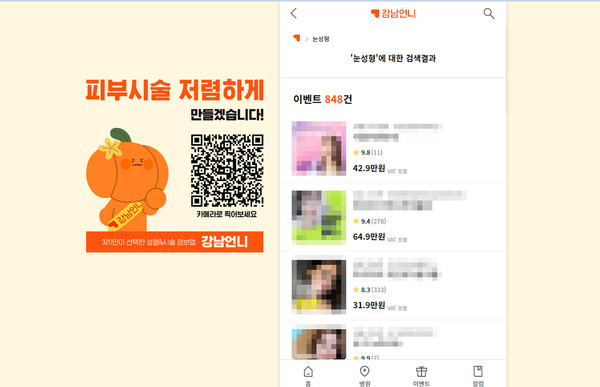As the government moves toward allowing the publication of non-paid medical expense information by one-line platforms, such as “Gangnam Sister," plastic surgeons opposed the move, saying it would allow patient solicitation and lower medical quality.
On Sept. 5, the government held an online meeting of the task force for economic regulatory reform and discussed allowing online platforms to publicize information on non-profit medical expenses.
The task force wanted to allow the publication of uninsured medical bills by online platforms through the authoritative interpretation of Article 56 of the Medical Service Act that prohibits medical advertisement and Article 42 of the same act’s enforcement decree concerning notifying uninsured medical costs.
A private member of the task force who discovered the task predicted that medical access would improve through online platforms.

However, the medical community said there are no grounds for such a prediction. Rather, the provision of information on non-paid medical expenses through the platform “intensifies over-competition among medical institutions and disrupts the medical order.”
The Korean Association of Plastic Surgeons issued a statement on Tuesday and expressed regrets that the latest government decision was a “judgment with many unconstitutional elements.”
The association said, “The government mentioned some companies through authoritative interpretation and conducted discussions without health care experts.” It then called for the government to “reveal the basis for the assessment that medical access declines due to non-disclosure of unpaid medical expenses.”
It said, “Instead of strengthening the control and surveillance of the cited online platforms, the government is moving to allow the publication of non-benefit medical bills on the platforms. This is an act of degrading medical care to the level of a commercial product, not the area of expertise directly related to public health.”
The group said what the government must do now is toughen management and supervision on online platforms, not loosen regulations on them.
What’s needed now is to check whether these platforms use and manage personal information collected from medical consumers legally, it said. It is in the public interest to manage and supervise these platforms’ unlawful activities.
“If the comparison of medical bills becomes the foremost criteria in selecting medical institutions and treatments, it would lead to the mass provision of low-quality medical services pursuing only efficiency,” the association said. “In an environment where hospitals have to attract patients with low medical bills, it will be hard to expect them to provide high-quality medical services.”

